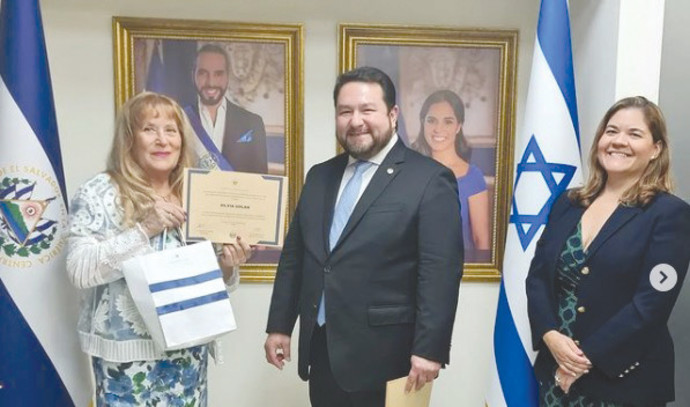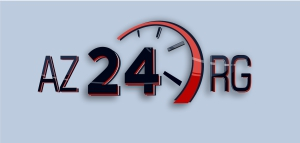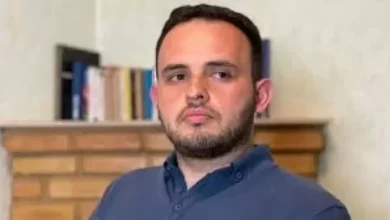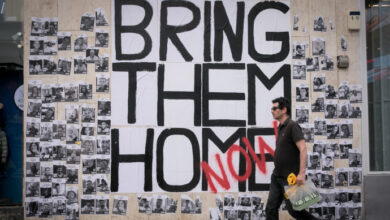Grapevine October 15, 2024: Live liturgy

On Thursday and Friday of last week, on the radio, there were endless renditions of slihot (penitential prayers) by different recording artists, as well as musical prayers from the Yom Kippur liturgy, such as “Ana B’koah,” “Sha’ar Harahamim,” “Unetaneh Tokef” (please, with strength; gate of compassion; let us relate the power) plus Leonard Cohen’s “Who By Fire,” which is based on the latter, and even Barbra Streisand singing “Avinu Malkeinu” (our Father, our King) which she sang in Jerusalem at the request of then-president Shimon Peres at his 90th birthday bash.
As uplifting as all this was in creating the mood for the holy day, nothing beats a live presentation by a top-notch cantor accompanied by an excellent choir, which was the case at the Jerusalem Great Synagogue, where Cantor Tzvi Weiss did the honors.
During the service on Saturday, part of the afternoon portion was sung by synagogue Vice President Zalli Jaffe, who is the twin brother of Choirmaster Elli Jaffe. Both brothers have magnificent singing voices. While Elli chose a career in music as a composer, conductor, and instrumentalist, Zalli quips that someone in the family had to take up a money-making career – so he became an international lawyer.
Unfortunately, many people who would have enjoyed listening to him were absent. There were too many empty seats, testifying to the sharp decline in tourism due to both the security situation and flight uncertainty. Too many airlines have suspended flights to and from Israel, and those that continue such flights often change both their dates and times, leaving passengers stranded in airports and hotels.
As this has received considerable publicity in the foreign media, would-be tourists are, by and large, not making their annual High Holy Day and Sukkot visits to Israel. Sukkot, like Passover, is an unofficial marriage market with hundreds of young people of marriageable age flocking to Israel and meeting each other at festive dinners, in synagogues, and in hotel lobbies. But this year, there were very few congregants from abroad.Kol Nidrei at the Great Synagogue
In bygone years, Kol Nidrei night at the Jerusalem Great Synagogue was so crowded that people who didn’t have seats sat on the stairs in the women’s gallery, where there are several staircases. This year, with the exception of a couple of people who preferred to sit on the stairs despite the fact that there were ample unoccupied seats, the stairs were empty, and there was plenty of room for anyone who happened to walk in by chance.
What was disturbing on both Kol Nidrei night and the following day was the number of cars parked on the sidewalk, where, in some cases, they created impediments for pedestrians. There are two car parks in close proximity to the Great Synagogue and another large one a short block away on Ahad Ha’am Street. There was absolutely no excuse for parking on the sidewalk.
In addition, bikies who had the open road to themselves often preferred the sidewalk, which was more dangerous than usual for pedestrians, because there were so many more of them walking to and from synagogues. A relatively new phenomenon was the number of children of single-digit age who came to synagogue with their scooters and turned the large entrance foyer into a racing arena where they whizzed around in circles, paying no heed to the number of people walking through the foyer at any given time.
National Day of the Republic of China ceremony held in Jerusalem
■ The ceremony for the National Day of the Republic of China, more commonly known as Taiwan, is usually held in Tel Aviv, where the Taipei Economic and Cultural Office is located – but for the first time, the reception was held in Jerusalem last week. For all intents and purposes, TECO functions as an embassy, but is not acknowledged as such even though Representative Abby Lee (known at home as Yaping Li), is a fully fledged ambassador.
The attendance was more than triple that of past receptions in Tel Aviv, and unlike those, the overwhelming majority of guests came in formal attire in accordance with the request on the invitation.
Another point of difference was that in receptions of this kind, the host or hostess is the first speaker and the Israeli representative(s) speaks last.
Jerusalem Mayor Moshe Lion, who was first at the microphone, gave Lee her full title, which may have been a gesture of respect and appreciation, or may have been an indication that Lion knows something that has yet to be made public. Although there has been a warm relationship between Israel and Taiwan since 1993, with many cooperative and joint ventures, the two countries do not enjoy full diplomatic relations because of possible repercussions from China, which has blocked many countries from having full diplomatic relations with its breakaway neighbor.
Given the fact that China seeks to unite Palestinian factions and is considered to be a supporter of Hamas, in addition to which it has publicly announced its backing of Iran throughout the Middle East, perhaps the time has come for Israel to give proper recognition to its friends. Taiwan was one of the first countries to stand in solidarity with Israel in response to the October 7 carnage and the kidnapping of hostages by Hamas.
Taipei has provided considerable aid to Jerusalem during this period of extreme crises, and Lee and her team have been personally involved in hands-on help projects.
Due to the absence of diplomatic relations, the event was not attended by government officials or by ambassadors whose countries likewise do not have full diplomatic relations with Taiwan. The official Israeli representative at Taiwan events is always a member of the Knesset and usually a member of the Israel-Taiwan Parliamentary Friendship Committee.
The Knesset was represented by former Knesset Speaker Mickey Levy and MK Boaz Bismuth. Former head of the parliamentary friendship group and former minister Nachman Shai was also present and said that he had an abiding fondness for Taiwan.
Parliamentary friendship groups visit each other’s countries and receive red carpet treatment.
Both Lion and Levy characterized Lee as “a true friend of Israel.”
Lion, who was particularly pleased to have the reception in the capital, said: “Today from Jerusalem, we also look east – to the Far East – and meet a friend with strong bonds to our city, who stands with us in the face of the challenges of today, and also stands with us as we look to open up opportunities for a better tomorrow.”
He also noted that the archipelagic nation’s celebration of its National Day in the capital was “a symbol of the strong and meaningful friendship between Taiwan and our beloved city of Jerusalem.” Both Lion and Levy (who happens to be a native son of Jerusalem, and former head of the Jerusalem Police) spoke of mutually enriching areas of cooperation such as technology, education, health trade and innovation.
Levy emphasized that Israel can be an important partner for Taiwan.
Lee, Lion, and Levy each spoke of the urgency of the immediate return of the hostages, with Lee declaring: “Our prayers are with the hostages and a safe return for each and everyone serving in the army.”
Relating to similarities between Israel and Taiwan, she stated that these are two nations “which never surrender to pressure.” Commenting on their closeness despite geographic distance, the ambassador said that even during wartime, several important agreements were concluded. Lee was also pleased that in recent months, her country had been visited by members of government and academics. Almost echoing the United States, she said that the relationship between Taiwan and Israel was “unbreakable and indispensable.” She complimented Israel on its resilience and its bravery, which she called an inspiration.
If there is applause at national day events following the address by the ambassador, it is polite and brief. This is not so in the case of Abby Lee, who received an enthusiastic ovation indicating not only how well her remarks had been received but also how popular she was in a number of Israeli circles.
Israelis bolstering relations with Taiwan
■ Probably the most long-standing of Israel’s friends of Taiwan among the guests at the reception was Jerusalem-born Meron Medzini, 92, Emeritus Professor of Asian Studies at the Hebrew University, who very recently returned from the East Asian island nation, where he was a member of a Hebrew University delegation that signed an exchange and cooperation agreement with National Chengchi University, and which also visited the Institute for National Policy Research.
In January of last year, Abby Lee, on behalf of the Foreign Affairs Ministry, presented Medzini with Taiwan’s Friendship Medal of Diplomacy for his contributions to deepening Taiwan-Israel Relations and for promoting Taiwan studies.
Lee also thanked Medzini for his book Taiwan: History, Politics, and Society, which has become a textbook in the East Asian departments of Israel’s colleges and universities.
Medzini, whose personal relationship with Taiwan goes back to 1970 – when he was invited by the Taiwanese government press office, which sought his advice on how to deal with foreign journalists – has been there several times and, prior to this most recent visit, was there in 2019 to collect material for his book.
Writing in Israeli media, Medzini has been a tireless advocate for the country’s democracy and freedom. In comparing Israel and Taiwan, he has noticed among the similarities that both have powerful enemies, strong armies, lack of national resources and close ties with the US.
Medzini also taught contemporary Japanese history during his 44 years at the Hebrew University. Some of his students were second-generation members of their families, whose parents had been among his students and who frequently recalled how much they had enjoyed his classes. He has also been recognized by Japan, and in 2016 was awarded the prestigious Order of the Rising Sun.
During the Yom Kippur War, Medzini was director of the Government Press Office and was also the personal spokesman for Golda Meir, whom he had known all his life. Golda and his mother, Regina, had been childhood friends since being together in 5th grade in Milwaukee and had maintained their friendship in Israel.
When asked whether he had heard the recently declassified recording of Golda addressing the cabinet during the Yom Kippur War, he revealed that he had been present when she made that address.
In 2017, his book Golda Meir – A Political Biography won the Prime Minister’s Prize. In August of last year, just two days before he celebrated his 91st birthday, Medzini was in Los Angeles for the screening of Golda at the Jewish Film Festival. He was one of the advisors for the film’s production.
Being part of history, and not just witnessing or reporting on it, runs in the Medzini family DNA. His father, Moshe Medzini, was a well-known seasoned journalist who, in November 1947, broadcast the result of the vote on the resolution for the Partition of Palestine from the United Nations building in New York, which six months later led to the establishment of the State of Israel. The broadcast was relayed on Jerusalem Radio, which was the precursor of The Voice of Israel, now part of the KAN 11 network – the Israel Public Broadcasting Corporation.
Although he officially retired at age 85, Meron Medzini remains in constant demand as a public speaker, lecturer, essayist, and podcast broadcaster in both English and Hebrew.
10th anniversary of Polin Museum in Warsaw
■ Another frequent flyer guest at the Taiwan reception was Laurence Weinbaum, World Jewish Congress Global Representative in Israel, Director-General of the Israel Council on Foreign Relations, and Editor-in-Chief of the Israel Journal of Foreign Affairs. Around the time that Medzini was in Taiwan, Weinbaum was in Warsaw to attend the 10th anniversary of the Polin Museum of the History of Polish Jews.
As happened at the impressive opening ceremony in April 2013, which was attended by Jewish dignitaries and philanthropists from around the world – including then-president Reuven Rivlin with an entourage that included yours truly – the 10th anniversary was also attended by many Jewish people who live outside of Poland, as well as several Polish Jews and citizens of Israel, the United States and elsewhere, who live in Poland, and top ranking Polish officials.
Weinbaum, who studied in Poland and speaks Polish fluently, is often invited to conferences and other important events in Poland. He shared some of his impressions during small talk clusters at the Taiwan reception.
One of the visionaries of the museum who spoke was historian, journalist and Auschwitz and death march survivor Marian Turski, whose former name was Moshe Turbowicz. He is vice president of the Jewish Historical Institute in Poland, a member of the governing board of the Association of Jews, Veterans and Victims of the Second World War, and a member of the International Auschwitz Council, among other important positions that he holds.
At 98, his mind is still as clear as a bell; he delivered a speech that lasted more than an hour without referring to a single note. In fact, Turski announced prior to his address that this was not the speech that he intended to make, said Weinbaum, adding that it was indeed an excellent oration.
Throughout the event, a line from the “Partisan’s Song” in Yiddish – “Mir zenen do” (We are here), which Turski used in the address he had given at the opening ceremony a decade earlier, was projected on a large screen in his own handwriting.
Among those present were Piotr Puchta, a former diplomat who had served in Israel and who is now CEO of the Foundation for the Preservation of Jewish Heritage in Poland; former Polish ambassador to Israel Maciej Kozlowski and his Israeli wife Nili; Israeli Ambassador to Poland Yakov Livne; Chief Rabbi Michael Schurich, born in New York of Polish ancestry; Michael Traison, an American lawyer who divides his time between Israel, Poland and the US and encourages recognition of Poles who work toward preserving Jewish heritage in Poland.
Also present were New York native Jonathan Orenstein, who is executive director of Krakow’s Jewish Community Center; Monika Krajewski, who with her husband Stanislaw published Poland’s first album on Jewish cemeteries, which contributed to Jewish renewal in Poland; Grazyna Pawlack, who is responsible for the Virtual Shtetl; and Barbara Kirshenblatt-Gimblett, who has been involved with the Polin Museum since its inception and was the curator of its core exhibition.
Museum Director Zygmunt Stepinski was delighted when Presidential Chancellery head Wojciech Kolarski, in the name of Polish President Andrzej Duda, presented the museum with an original example of the Polish language Jewish daily Nasz Przeglad (Our Review) dated May 16, 1935, which covered the ceremonies relating to the death of Marshal Jozef Pilsudski, whose army included many Jewish soldiers.
Video-taped messages were sent by World Jewish Congress President Ronald Lauder, Yad Vashem Chairman Dani Dayan, and US Envoy for monitoring and combating antisemitism Deborah Lipstadt.
Obelisk dedication in Warsaw
■ Coinciding with the 10th anniversary event was another one that was possibly more emotional. The Olivestone/Olivestein family, led by Corinne Evans, dedicated an obelisk at the Okopowa Cemetery to the more than 50 of their relatives who perished in the Holocaust. The dedication ceremony was live-streamed to family members who were unable to attend, including Cedric Olivestone in Israel. Rabbi Schudrich was present and, later that evening, hosted the family and their friends from many parts of the world at a reception at the Nozyk Synagogue, which is home to a Torah scroll donated by Evans.
Completed in 1902, the Nozyk Synagogue is the only one in Warsaw that survived the Holocaust. It was desecrated by the Nazis during the German occupation and again by the Communists after the war. Though partially damaged during the war, it was not destroyed, but it took a long time for restoration to begin. The destroyed section was completely rebuilt between 1977 and 1983, and the synagogue reopened for services that April.
Solid signs of the revival of Jewish life in Warsaw can be seen in the number of active synagogues today. In addition to Nozyk which is Orthodox, there are Chabad which is also Orthodox but different from Nozyk; Beit Warszawa which is Reform, and Masorti which is Conservative.
Holocaust survivors remembered in Austria
■ Kristallnacht, the “Night of Broken Glass,” took place in Austria and Germany on November 9-10, 1938, when the windows of Jewish shops, houses, and community buildings were broken by Nazi bully boys, and Jews were beaten up.
Austria, which was slow in acknowledging its role in the Holocaust, eventually did so. Eighty-three years later, on November 9, 2021, the Shoah Wall of Names bearing the names of 64,440 Austrian Jews – men, women, and children – who were murdered during the Holocaust was inaugurated in Vienna in the presence of senior Austrian and Israeli government representatives, Holocaust survivors, and families of victims.
Austria has now gone a step further in etching the Holocaust into public memory. On Tuesday of this week, Yad Vashem inaugurated a poignant new exhibition entitled Torn from Life: The fate of Austrian Jews after the Anschluss in 1938. The exhibition will go on view in the building of the Austrian Parliament. It includes, among other exhibits, family items such as a photo album, a stool, a satchel for phylacteries, and a miniature Torah scroll.
The exhibits tell the personal stories of 14 Jews who were forced to flee the landlocked Central European country. The exhibition, which is a joint project of Yad Vashem and the Austrian Federal Chancellery, was opened by Yad Vashem Chairman Dani Dayan, Austrian Parliament President Wolfgang Sobotka, and representatives of the families whose artifacts are on display.
In January of this year, the European Jewish Congress presented Sobotka with the Golden Vision Award in recognition of his long-standing support of the Austrian Jewish community and his commitment to combating antisemitism and fostering Jewish life.
Many survivors of the “Final Solution” lovingly treasure personal or family objects from the pre-war period, and as they advance in years, they begin to fear that their heirs will not cherish these objects and may even throw them out. In order to preserve these symbols of the past, they give them to Yad Vashem for safekeeping for future generations.
Every exhibit has its own story.
The exhibition will remain on display till November 10.
Silvia Golan at El Salvadorian embassy
■ One of the busiest reporters of social life in Israel is Argentine expat Silvia Golan, who, despite the fact that she does not own a car, travels all over the country, including to kibbutzim and moshavim to cover social and cultural events. Golan is a permanent fixture at Latin American diplomatic and other events due to the fact that she makes instant friends with new diplomats from Latin American countries and often helps them with introductions and know-how.
At the reception hosted by El Salvador Ambassador Milton Eduardo Umaña Acevedo and his wife Cecilia in celebration of their country’s 203rd anniversary of independence, it was announced that there is no longer a waiting period for passports, which are now issued immediately online.
Golan had no need for an El Salvador passport but was pleasantly surprised when the ambassador presented her with what looked like a gift bag, which contained a diploma of recognition attesting to her cooperation with the embassy and with various personalities from El Salvador. Golan is the executive director of the online magazine Diplomacy. She is never without her camera and often gives it to a friend or acquaintance for use when she wants to be photographed with various personalities.
Sukkot open house at the President’s Residence
■ The annual open house at the President’s Residence during Sukkot is an event to which the general public looks forward because, for many people, it’s the only way they can get into the complex and possibly meet President Isaac Herzog and his wife Michal in the presidential sukkah, or in the grounds of the estate, and if they’re lucky they even get a selfie with one or both of them.
This year’s open house will take place next Tuesday, which is the day before Simchat Torah, the anniversary of the October 7 Hamas massacre, according to the Jewish calendar. The event, which will understandably be devoted to people from the most vulnerable areas of the country, will be quite different in many respects from previous ones. Details are not yet available but will be published as soon as they are finalized.





